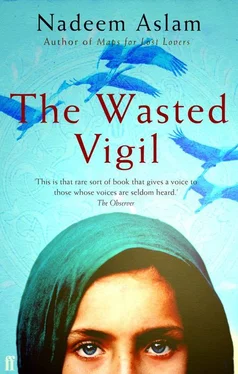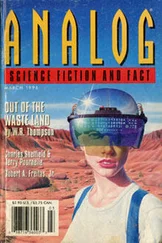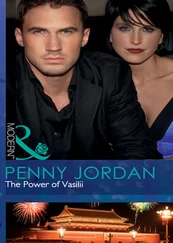Nadeem Aslam - The Wasted Vigil
Здесь есть возможность читать онлайн «Nadeem Aslam - The Wasted Vigil» весь текст электронной книги совершенно бесплатно (целиком полную версию без сокращений). В некоторых случаях можно слушать аудио, скачать через торрент в формате fb2 и присутствует краткое содержание. Год выпуска: 2009, Издательство: Faber and Faber, Жанр: Современная проза, на английском языке. Описание произведения, (предисловие) а так же отзывы посетителей доступны на портале библиотеки ЛибКат.
- Название:The Wasted Vigil
- Автор:
- Издательство:Faber and Faber
- Жанр:
- Год:2009
- ISBN:нет данных
- Рейтинг книги:4 / 5. Голосов: 1
-
Избранное:Добавить в избранное
- Отзывы:
-
Ваша оценка:
- 80
- 1
- 2
- 3
- 4
- 5
The Wasted Vigil: краткое содержание, описание и аннотация
Предлагаем к чтению аннотацию, описание, краткое содержание или предисловие (зависит от того, что написал сам автор книги «The Wasted Vigil»). Если вы не нашли необходимую информацию о книге — напишите в комментариях, мы постараемся отыскать её.
The Wasted Vigil — читать онлайн бесплатно полную книгу (весь текст) целиком
Ниже представлен текст книги, разбитый по страницам. Система сохранения места последней прочитанной страницы, позволяет с удобством читать онлайн бесплатно книгу «The Wasted Vigil», без необходимости каждый раз заново искать на чём Вы остановились. Поставьте закладку, и сможете в любой момент перейти на страницу, на которой закончили чтение.
Интервал:
Закладка:
*
Lara’s eyes are open in the darkness as she lies beside David, his hand on her rib. She feels a measure of safety here against him, though her mind is at the dacha with Stepan in the grip of his killers.
‘Who’s that out there? You said you were here alone, that your wife was back in Moscow.’
She had slipped away then, leaving the corridor and rushing upstairs to hide. They began to hurt Stepan, so that his cries would force her to reveal herself.
‘Just like my brother was tortured to call me back to Chechnya.’
Of course she presented herself to them, unable to bear it any longer, Stepan’s mouth hoarse from shouting at her to stay where she was — to run away into the snow and ice outside — and then just from screaming.
*
There are tough calluses on many areas of his skin as though part of his body is shell. He can survive this. Under the white lantern moon he runs down the alley away from the acacia grove, casting a long sharpened shadow before him. He feels the night itself had come alive to attack him back there, the air clotting into predator muscle, into bone and razor. The noise of the guns going off will bring men who will give chase. He is not sure whether the sounds he can hear are his own thoughts or something outside him. With one hand he is holding a fold of his blanket to the back of his head to staunch the blood flow, his fingers wet. Allah is on his side. We have created the human being in the throes of loss. But does he think no one is watching over him? Haven’t We made for him two eyes, a tongue, and two lips? And guided him to two places of safety in distress? He must find somewhere to tend to the wound, mustn’t lose focus. His blood bellowing in his ears. Two places of safety. He is very cold as though his skeleton is made of ice. Now suddenly he knows where he must go: towards the house that belongs to a doctor — he had pasted a shabnama on the metal signboard outside it. He’ll go and ask for — or demand — help with his injury. As he runs his head spins. The peripheries of his soul don’t feel bound within his body.
*
‘How big is the Cosmos Oak?’
‘Say that again. My mind was elsewhere.’
‘Nothing.’
David is standing at the window.
We and others like us will never stop until we have covered ourselves in glory by reaching Jerusalem and blowing up the White House, says the Night Letter.
He has dressed, and she is sitting on the bed wrapped in a sheet, hugging herself with the fingers that had gently slid into his hair earlier, when they were both searching for themselves in each other.
When he touched her he felt it was not in the present. He was as though a ghost, watching himself place his hand on her shoulder, his mouth on her thigh. Either a ghost or a memory. He is not young enough to believe that a moment can be seized, no longer a child who looked at the hundred clocks in his grandfather’s workshop without seeing that the hands were moving like scythes.
‘I’ll see today if I can find James Palantine and talk to him,’ he tells her, moving towards the door. ‘He’ll talk to Gul Rasool to find out about Benedikt.’
‘Who is James Palantine?’
‘His father, Christopher, was someone I knew, though I know him too. He is friends with Gul Rasool — an “associate” is probably a better word. He is responsible for Gul Rasool’s security. I knew Christopher Palantine back in the 1980s in Peshawar.’
‘When you were in espionage?’
A hesitation.
Both Christopher and he were. He thinks of the CIA’s motto. From the Gospel of John: And ye shall know the truth and the truth shall make you free.
He opens the door and leaves. Outside the wind rustles in the trees as though trying to speak someone’s name.
5. Street of Storytellers
DAVID HAS HEARD it said that no other war in human history was fought with the help of as many spies. When the Soviet Army crossed the River Oxus into Afghanistan in December 1979, secret agents from around the world began to congregate in the Pakistani frontier city of Peshawar. It now became the prime staging area for the jihad against the Soviet invaders, rivalling East Berlin as the spy capital of the world by 1984.
By then seventeen thousand Soviet soldiers had been killed, and David had been living in the city for two years. Because it was once the second home of Buddhism, the city could count Lotus Land among its almost forgotten names, the peepal tree under which the Enlightened One was said to have preached continuing to grow in a quiet square.
The City of Flowers.
The City of Grain.
It was transformed into a city filled with conjecture, with unprovable suspicions and frenzied distrust. Everyone’s nerves were raw and everyone had something hidden going on. For most of its history it was one of the main trading centres linked to the Silk Road, and now the United States was sending arms into Afghanistan through here. Wherever David looked he could find evidence of the war in which those weapons were being used. Makeshift ambulances filled with the wounded and the dying raced through the mountain passes towards Peshawar, carrying at times children who had been set alight by Soviet soldiers to make the parents reveal the hiding places of guerrillas. Dentists filled cavities with shotgun pellets in Peshawar.
Having trained with the CIA, David now had an office in the Jewellers Bazaar, his interest in gems an ideal façade. He had met Christopher Palantine during the Islamabad embassy siege back in 1979, when Christopher had put forward the possibility that he might like to answer a few questions upon returning from his forthcoming trip to Afghanistan. To gain information about the Soviet Union, the CIA had been known even to question the pilgrims who arrived in Mecca from the central Asian republics, the Saudi Arabian government allowing this because of the abhorrence it felt for Communism. And David too had agreed readily to Christopher’s request. By the time his sentient life began, a hatred and fear of Communism was in the air an American child breathed, and it could have remained as just subconscious animosity, but there was the matter of Jonathan’s death. The Soviet Union had supported Vietnamese guerrillas and had thus played a role in the disappearance and probable death of his brother. He was fourteen years old when the news came that Jonathan was missing presumed dead. Even the festive occasions would now be sad ones because Jonathan wasn’t there, and everything reminded David of him. He wept into the crook of his arm standing in front of the house: as soon as they reached the age of twelve, both he and Jonathan were allowed in the mornings to take the car out of the garage and down this very driveway while their father collected his coat and briefcase. As the days passed without further news of Jonathan, his father gently began to ask him whether he would be able to control his tears — the two of them had to give strength to their mother. But a fire of immense intensity burned inside his young body. Having trapped a coyote in the woods one day he began to hit it with a club. Who gives a fuck if this is wrong. He needed release, and, as though he wished to obliterate the evidence of what he had done, he continued to beat the animal long after it was dead. And for the rest of my life I am going to do everything I can to fuck up the Reds.
But that was then. By the time he came to Peshawar as an employee of the CIA, his opposition to Communism was the result of study and contemplation. Not something that grew out of a personal wound.
He was in Peshawar as a believer.
*
An almost blind white-haired poet lived in the apartment next to David’s office in the Jewellers Bazaar in 1984, having fled death threats from both the Communists and the Islamic guerrillas in Kabul some months earlier. For most of the day he sat cross-legged on a threadbare rug on the floor, surrounded by books. A god of immutable stone, the entire earth his plinth.
Читать дальшеИнтервал:
Закладка:
Похожие книги на «The Wasted Vigil»
Представляем Вашему вниманию похожие книги на «The Wasted Vigil» списком для выбора. Мы отобрали схожую по названию и смыслу литературу в надежде предоставить читателям больше вариантов отыскать новые, интересные, ещё непрочитанные произведения.
Обсуждение, отзывы о книге «The Wasted Vigil» и просто собственные мнения читателей. Оставьте ваши комментарии, напишите, что Вы думаете о произведении, его смысле или главных героях. Укажите что конкретно понравилось, а что нет, и почему Вы так считаете.












